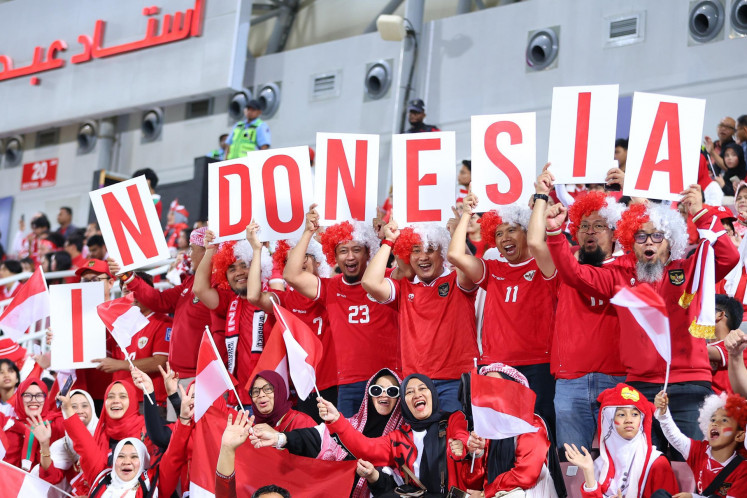Polluted rivers bring water treatment issues to fore
Although Jakarta has made major strides in infrastructure development over the past few years, an inadequate tap water supply and a lack of proper wastewater treatment facilities show there is still much work to be done
Change Size

A
span>Although Jakarta has made major strides in infrastructure development over the past few years, an inadequate tap water supply and a lack of proper wastewater treatment facilities show there is still much work to be done.
Raw water is also an issue of concern because the 13 rivers that run through the capital are heavily polluted.
Jakarta residents mostly relied on the Jatiluhur Reservoir in West Java, which gets its water supply from the Citarum River, as the city’s Krukut and Pesanggrahan rivers contributed to only 6 percent of the raw water supply, according to Jakarta Governor Anies Baswedan.
The city administration recorded a significant increase in rivers categorized as heavily polluted in Jakarta from 32 percent in 2014 to 61 percent in 2017.
The president director of city-owned wastewater treatment firm PAL Jaya, Subekti, told The Jakarta Post that the low contribution was mainly due to untreated wastewater being discharged into the rivers.
“Why so little? Because wastewater, either from domestic or industrial use, is [discharged] directly into the rivers,” he said on the sidelines of the 2019 Run for Water event in Jakarta on Sunday, which was held to commemorate World Water Day, which falls on March 22.
The polluted conditions are not expected to improve if the city does not develop a proper wastewater treatment (IPAL) facility.
Jakarta’s sole IPAL, located in Setiabudi, Central Jakarta, can only treat about 2 percent of the city’s wastewater.
To improve sanitation, as well as the rivers’ water quality, the Public Works and Housing Ministry, the city administration and PAL Jaya, in cooperation with the Japan International Cooperation Agency (JICA), laid out a wastewater treatment master plan in 2012.
The plan, along with the Jakarta Sewerage System (JSS), aims to improve the coverage of processed household wastewater in 15 zones across the city before the water is pumped into the rivers.
The Rp 69.6 trillion (US$4.8 billion) project comprises short-term development for Zone 1 in Pluit, North Jakarta, and Zone 6 in Durikosambi, West Jakarta; mid-term development for Zone 2 in Muara Angke, Zone 5 in Sunter and Zone 8 in Marunda — all in North Jakarta; and the long-term development for the remaining mayoralties.
Subekti said the latest development was Zone 1’s detailed engineering design (DED), which would be completed by May. Hence, the construction of Zone 1, worth Rp 8.7 trillion, could begin in September 2020. The construction will include about a 20 percent investment in a wastewater treatment plant and 80 percent for sewer pipes.
“Zone 6 [will be constructed] afterward,” he added.
In addition to the centralized system, the communal IPAL and revitalization of septic tanks are also required to simultaneously provide residents with access to a sanitation system during the project’s construction. The communal IPAL would then be connected to the sewer pipes once the project is completed.
The Jakarta Water Resources Agency’s raw water, clean water and wastewater department head, Eko Gumelar, told the Post recently that 10 communal IPAL facilities would be developed this year.
Most of the communal IPALs will have the capacity to treat 50 cubic meters of wastewater.
Despite being upbeat about the construction, Subekti said development would be difficult because of the late connection of the sewer pipes.
“Wastewater treatment is a basic facility that should have been developed before everything else,” he added, cited examples of gas, water and electrical piping that must be adjusted during the construction phase.
“[Construction] must be completed because Jakarta has yet to develop an underground utilities master plan,” he said.
Other problems faced by the firm include public behavior regarding sanitation.
“Sanitation and wastewater treatment are examples of a civilization. There, we can see our culture,” he said, citing an example of people living in high-rise buildings who disposed of solid waste in their toilets.
Meanwhile, the president director of city-owned tap water company PAM Jaya, Priyatno Bambang Hernowo, highlighted public awareness regarding groundwater extraction.
“We know that some people have access to piped water, but they are reluctant to use it, deeming [groundwater] to be of good quality,” he said.
Hence, spreading awareness about the importance of not using groundwater and the introduction of a water-saving campaign were badly needed, he concluded.









